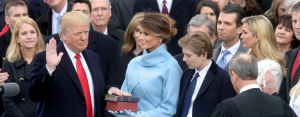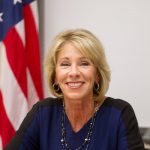It’s been almost seven weeks since President Trump was inaugurated, and it’s been quite tumultuous for those of us in colleges and universities around the country. Regardless of one’s politics, I think that many of us were not sure what to expect with the new administration, largely because then-candidate Donald Trump said relatively little about higher education during the campaign.

I wrote about the little he had said about the topic, and wrote a similar piece about Hillary Clinton’s proposals, which were more fleshed out. I also had written about the President-elect’s nomination of Betsy DeVos to the post of Secretary of Education.
Now that the administration has begun, we are starting to get a better idea of what we should expect, and certainly much of it is troubling. And I say troubling not just from the perspective of policies coming out of the Trump White House and his cabinet agencies, but troubling also because of a number of actions that cause me to be alarmed about the lack of understanding and expertise about higher education in the administration.
Some of these actions include:
- Betsy DeVos was confirmed as Secretary of Education by the Senate only after Vice President Pence had to exercise his role as President of the Senate to cast the deciding vote in favor of her confirmation. This was the first time in history that a vice president had to fulfill this role in order for a cabinet secretary to be confirmed.

Courtesy U.S. Department of Education Just a few weeks after her confirmation, Secretary DeVos issued a statement in advance of a meeting she and President Trump held with leaders of Historically Black Colleges and Universities (HBCU) in the country. In the statement, she included these lines:
“HBCUs are real pioneers when it comes to school choice. They are living proof that when more options are provided to students, they are afforded greater access and greater quality. Their success has shown that more options help students flourish.”
This statement demonstrated a stunning lack of understanding of the history of HBCUs in the nation. They did not begin simply to provide another “choice” to African American students, but rather, they started because these students were systematically excluded from public universities in many of the Southern and border states because of their race.
Not surprisingly – and appropriately so – the statement and DeVos were widely criticized. Commentators pointed out the insensitivity of the statement, and the lack of historical and contextual knowledge it demonstrated (DeVos was widely condemned during her nomination hearings for her lack of understanding of federal education policy in general). The statement has been removed from the department website, and the next day the department issued a new statement under Secretary DeVos’s name where she acknowledged the true genesis of HBCUs.
- February also saw a tussle between Secretary DeVos and newly-confirmed Attorney General Jeff Sessions over the issue of the rights of transgender students in schools and colleges. The Obama administration had issued guidelines to educational institutions around the country that required them to include protection of the rights of transgender students under Title IX. This included allowing students to use the bathroom of their choice based on their gender identity. One of the first acts of Attorney General Sessions, with the concurrence of President Trump according to news reports, was to order a reversal of this guidance. News reports indicated that Secretary DeVos disagreed with the president and Sessions, but in the end, the two men won out and the Department of Education issued the order reversing the Obama-era guidelines.
- Perhaps what is the most concerning act of the administration has been the two Executive Orders, one issued in late January, and the second issued this week, which restrict entry into the United States of refugees and visitors from six (seven in the original order) predominantly Muslim countries. After the first order was successfully challenged in a number of court cases, most importantly in one led by the attorney general of the state of Washington, the administration went back to the drawing board and came up with a more narrowly-tailored order that is likely to also be challenged in court.The reasons these orders are disturbing to those of us in higher education go well beyond any perception of their legality, constitutionality, or just plain fairness. Many of our nation’s colleges and universities have students, faculty, and staff from these excluded countries who are not citizens and permanent residents of the U.S. (and yet are here with legal documentation) These orders will likely make it more difficult for them to travel in and outside of the country, thus harming the ability of faculty to teach and conduct research, and for students to attend classes and earn a degree. Colleges and universities in the United States have long prided themselves on being globally focused, both welcoming students and scholars from other countries as well as encouraging our own students and faculty to travel abroad to study and conduct research.
The University of San Francisco is a prime example of this; over 20 percent of our undergraduates and 17 percent of our overall population are international students. We are in the top dozen universities in the country in the proportion of our students who come from other countries.
Whatever President Trump’s motivation is for these orders, they are likely to have a detrimental impact on the flow of students and scholars in and out of the country’s colleges and universities, which in the end, will only serve to weaken them.
We also worry that these orders are a harbinger of further actions that could impede the flow of students and scholars in and out of this country. This could include restrictions on F-1 student visas and Optional Practical Training visas (which allow international students graduating from U.S. colleges to stay and work in the country following graduation).
There is certainly more going on in Washington that is likely to have impact on USF and other higher education institutions around the country, but this post is already long enough. I’ll return to some of these other issues in the future.